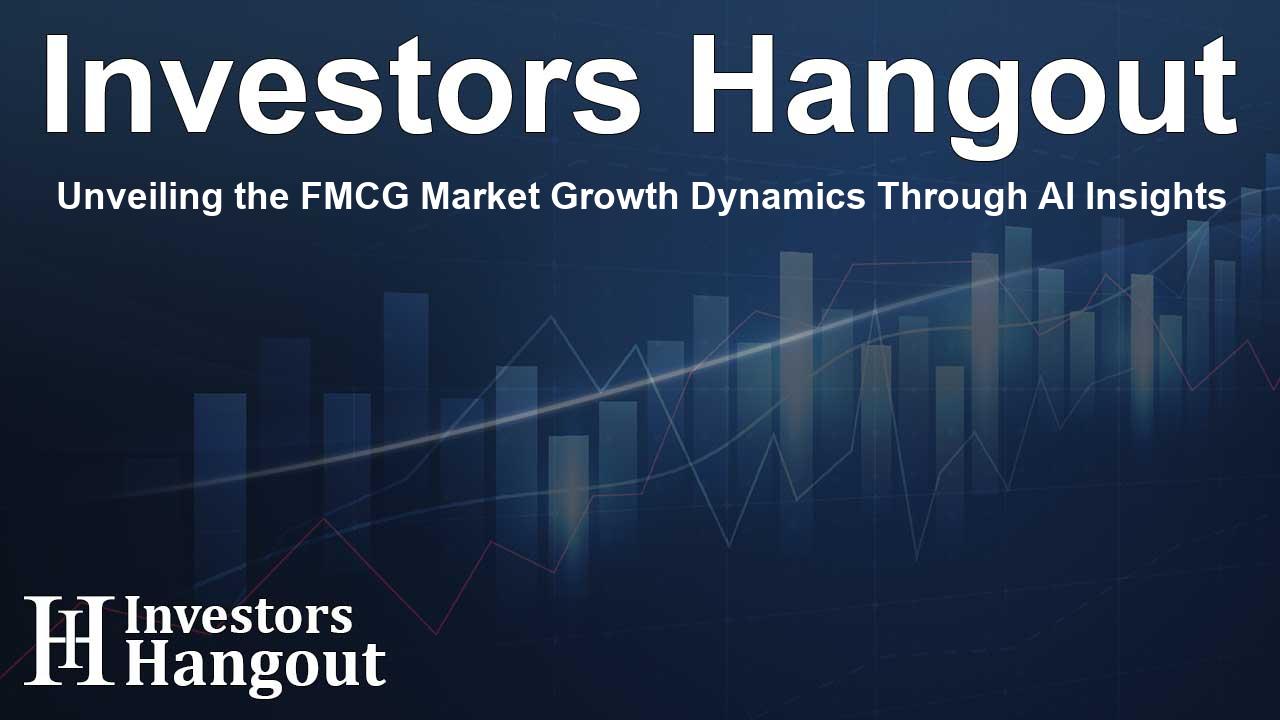Unveiling the FMCG Market Growth Dynamics Through AI Insights

AI Transformations in FMCG Market Growth
The Fast-Moving Consumer Goods (FMCG) market is on a remarkable trajectory, with projections indicating an impressive growth of USD 456.6 billion from 2024 to 2028. Key factors such as the rise of e-commerce and a shift towards convenient food options are significantly influencing this progression. As technological innovations redefine the landscape, the FMCG sector is witnessing a paradigm shift, making it essential to understand the implications of these changes.
Driving Forces Behind Market Expansion
Recent market analysis reveals that the FMCG sector is poised for extensive growth, attributed to an annual growth rate of approximately 3.27%. The increasing consumer inclination towards online shopping is creating vast opportunities for brands. Household dynamics are also shifting, with a growing number of dual-income families driving demand for ready-to-eat food products and convenient shopping experiences. This change underscores how lifestyle adaptations, particularly in urban areas, are directing market trends.
Market Segmentation and Key Players
The FMCG market encompasses several vital segments including food and beverages, personal care, health and hygiene, and home care products. Major players like Anheuser Busch InBev SA NV, Nestle SA, and Unilever PLC are adapting to these swift changes, actively responding to consumer preferences and technological advancements. As the market landscape evolves, these companies are investing in digital strategies to engage consumers effectively.
Challenges Impacting the Market
Despite the promising growth trajectory, the FMCG market faces notable challenges. Issues such as inflation and fluctuating raw material prices threaten profit margins while counterfeiting remains a persistent concern, particularly in semi-urban and rural areas. Brands are increasingly focusing on sustainability, aligning their offerings with rising health consciousness among consumers. Moreover, maintaining infrastructure capable of supporting evolving product lines is critical for future growth.
The Role of E-Commerce
The importance of e-commerce in the FMCG market cannot be overstated. Trend analysis indicates a significant boost in online sales, as consumers prefer the convenience of shopping from home. Platforms such as supermarkets and third-party websites are leading the charge, providing consumers with an expansive array of choices. This shift is prompting traditional brands to enhance their digital presence, especially as smartphone usage continues to rise.
Innovation Through Artificial Intelligence
Artificial intelligence is at the forefront of transformations occurring in the FMCG market. From streamlining supply chains to personalizing customer experiences, AI is redefining how companies operate. Brands are leveraging AI to analyze consumer data and adjust their strategies accordingly. This technological integration not only boosts efficiency but also enhances market responsiveness, paving the way for sustained growth.
Future Outlook
As we look towards the future, the FMCG market is likely to continue evolving. The combination of innovation in product offerings with an understanding of consumer needs positions companies for substantial growth. Adaptations to democratic preferences, the pursuit of sustainability, and the incorporation of technology will be paramount.
Frequently Asked Questions
What is driving growth in the FMCG market?
The FMCG market is primarily driven by increasing consumer preference for e-commerce, convenience in food products, and a growing middle-class demographic.
Which segments are showing the most growth?
Food and beverages, along with personal care and hygiene segments, are witnessing significant growth attributed to evolving consumer habits.
What challenges does the FMCG market face?
Major challenges include inflation, raw material costs, counterfeiting, and adapting to rapidly changing consumer preferences.
How is AI impacting the FMCG sector?
AI enhances operational efficiencies, personalizes consumer experiences, and allows companies to analyze market trends more effectively.
What is the expected CAGR for the FMCG market?
The FMCG market is projected to grow at a CAGR of approximately 3.27% between 2024 and 2028.
About The Author
Contact Thomas Cooper privately here. Or send an email with ATTN: Thomas Cooper as the subject to contact@investorshangout.com.
About Investors Hangout
Investors Hangout is a leading online stock forum for financial discussion and learning, offering a wide range of free tools and resources. It draws in traders of all levels, who exchange market knowledge, investigate trading tactics, and keep an eye on industry developments in real time. Featuring financial articles, stock message boards, quotes, charts, company profiles, and live news updates. Through cooperative learning and a wealth of informational resources, it helps users from novices creating their first portfolios to experts honing their techniques. Join Investors Hangout today: https://investorshangout.com/
The content of this article is based on factual, publicly available information and does not represent legal, financial, or investment advice. Investors Hangout does not offer financial advice, and the author is not a licensed financial advisor. Consult a qualified advisor before making any financial or investment decisions based on this article. This article should not be considered advice to purchase, sell, or hold any securities or other investments. If any of the material provided here is inaccurate, please contact us for corrections.
